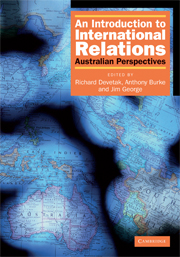Book contents
- Frontmatter
- Contents
- List of tables, figures and boxes
- List of contributors
- Preface and acknowledgments
- An introduction to international relations: the origins and changing agendas of a discipline
- 1 Theory and practice in Australian international relations: the search for identity and security
- Part 1 Theories of international relations
- 2 International relations theory in an era of critical diversity
- 3 Liberalism
- 4 Realism
- 5 Marxism
- 6 Feminism
- 7 Postmodernism
- 8 Constructivism and critical theory
- 9 Global justice and cosmopolitan democracy
- Part 2 The traditional agenda: states, war and law
- Part 3 The new agenda: globalisation and global governance
- Glossary of terms
- Bibliography
- Index
- References
8 - Constructivism and critical theory
from Part 1 - Theories of international relations
- Frontmatter
- Contents
- List of tables, figures and boxes
- List of contributors
- Preface and acknowledgments
- An introduction to international relations: the origins and changing agendas of a discipline
- 1 Theory and practice in Australian international relations: the search for identity and security
- Part 1 Theories of international relations
- 2 International relations theory in an era of critical diversity
- 3 Liberalism
- 4 Realism
- 5 Marxism
- 6 Feminism
- 7 Postmodernism
- 8 Constructivism and critical theory
- 9 Global justice and cosmopolitan democracy
- Part 2 The traditional agenda: states, war and law
- Part 3 The new agenda: globalisation and global governance
- Glossary of terms
- Bibliography
- Index
- References
Summary
Introduction
This chapter provides an overview of two strands of thought which have, over the past two decades or so, gained increasing profile in international relations. It begins by outlining what both theoretical strands have in common vis-à-vis the mainstream international relations theories they challenge; it then focuses on constructivism's key arguments, background, and scope. This exposition is followed by an outline of Critical Theory's key motifs.
Among the things constructivism and Critical Theory share is that neither is actually atheory in the narrow sense, and that both register significant disagreements with neoliberal and neorealist theories, which are, according to some, still dominant in the discipline. Neoliberalism and neorealism share virtually all meta-theoretical premises: ontologically, both treat states as unitary rational and self-interested actors, consider the international system to be anarchic, and argue that ‘domestic’ factors have no significant impact for the dynamics of international interaction. Epistemologically, both are oriented towards testing their theoretical positions by observing the behaviour of the state actors in question. Methodologically, both are committed to similar ways of identifying and collecting empirical data, and submitting such data to comparable analytical processes in order to prove or disprove their respective hypothesis.
Critical Theory and constructivism disagree with neoliberalism and neorealism at the level of meta-theory. Ontologically, critical theorists and constructivists will hold that actors other than states matter in world politics, and that what actors do is significantly influenced by who they are, and how they perceive themselves and others.
- Type
- Chapter
- Information
- An Introduction to International RelationsAustralian Perspectives, pp. 96 - 108Publisher: Cambridge University PressPrint publication year: 2007
References
- 1
- Cited by



